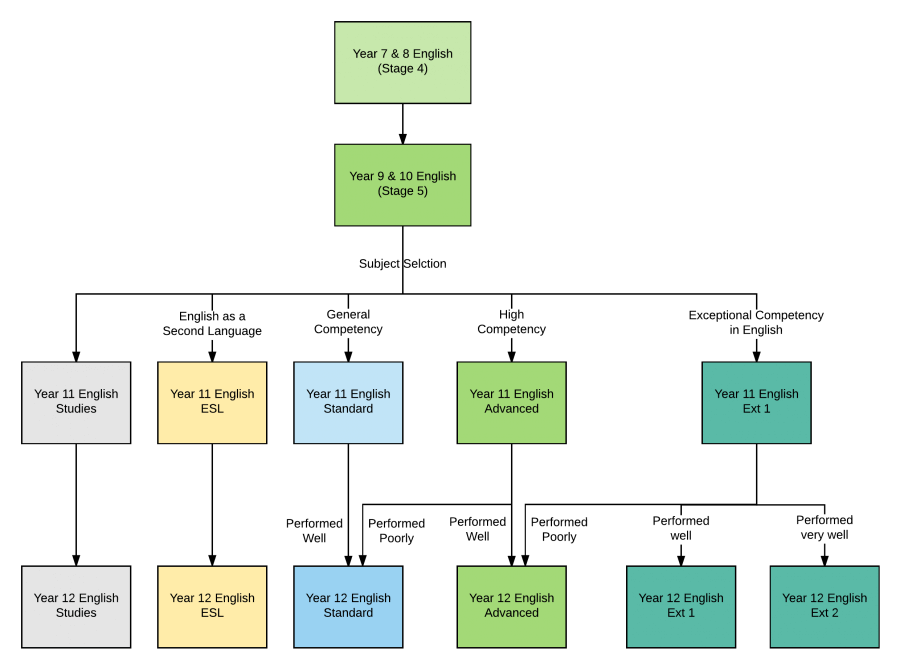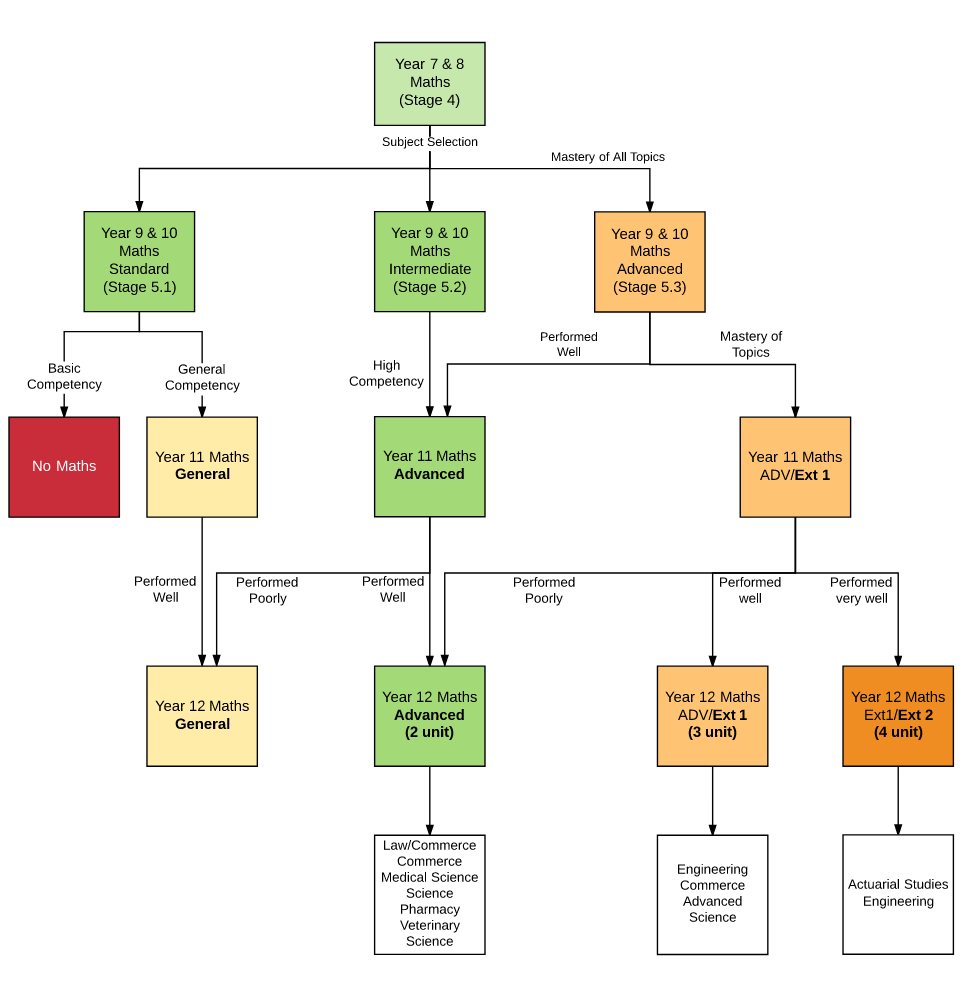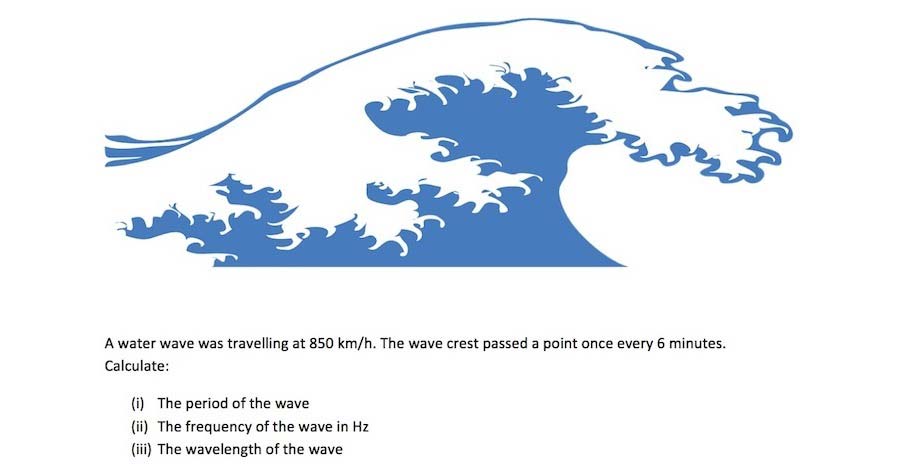Year 12 Common Module Study Guides
Learning methods available
Select a year to see available courses

Many parents are unsure of what happens in Year 9 as their child transitions from Year 8.
Year 9 is the first year of Stage 5 where students are expected to start taking a greater ownership of their learning. Students get to pick the elective units that they wish to study – this includes art, drama, languages, economics. In Year 9, the students will begin the Stage 5 curriculum, and as a result, they will sit an important NAPLAN test. This test assesses their literacy and numeracy levels against the Stage 5 standard.
What’s expected of students in Year 9
Students must prepare for the following when transitioning into Year 9:
Year 9 is the first year of Stage 5.
Evidently, Year 9 is a very important step on a student’s journeys to HSC success. Let’s look at the changes between Year 8 and Year 9.
In Year 9, students get to select their first electives. For example, your child can decide what languages they want to pursue. They might choose to do Art or Drama. Let’s have a look at what changes between Year 8 and Year 9:
| Year 8 | Year 9 | |
| Table: Comparing Years 8 and 9 | ||
| Concepts | Consolidate and master Stage 4 concepts before advancing to stage 5 | Demonstrate mastery of the Stage 4 concepts
Introduce the Stage 5 concepts and expectations Begin studying specialised subjects |
| Subjects | Subjects are set for study by the School:
English Mathematics Science Creative Arts Human Society and its Environments Languages PDHPE Technology and Applied Studies |
Compulsory subjects are set by NESA:
English Maths – Some schools will offer accelerated maths Science Students choose their elective subjects from the following categories: Creative Arts Human Society and its Environments Languages PDHPE Technology and Applied Studies |
| Homework | 1.5 hours per day | 2-3 Hours per day |
| NAPLAN | No NAPLAN assessment | Year 9 NAPLAN assessment |
Students will notice a significant increase in the amount of work for their subjects. This means that students will need to do a significant amount of homework each night.
Conscientious students will do at least 2 hours study per evening.
This will equate to between at least 10 and 12 hours of study each week! Students should take this into consideration when choosing their elective subjects.
In Year 9,
The NSW Education Standards Authority (NESA) divides the learning outcomes for students 6 Stages for Kindergarten through to Year 12.
Stage 5 is where students begin to encounter more complex problems and develop the core skills required for the HSC.
Parents of students from Australian Primary Schools may already be familiar with NAPLAN (National Assessment Program – Literacy and Numeracy). NAPLAN is a series of assessments throughout the school grades designed to track children’s literacy and numeracy skills. Here’s what you need to know about NAPLAN:
For English, students must answer:
For Mathematics, students must answer questions on:
If you would like to know more about NAPLAN,
Matrix courses cover the skills that are assessed in NAPLAN, and will give your child confidence going into these compulsory exams.
Year 9 students will learn the following compulsory subjects:
At many schools, students will need to choose their elective subjects. These elective subjects will be drawn from these broad subject areas:
It is important for you to have a comprehensive discussion about subject selection with your child and their teachers. Students need to think about how these subjects might suit their long-term study goals. Students need to find a balance between the practicality, their enjoyment, and their skill-levels for these subjects.
Year 9 English is where students polish their essay writing skills. Year 9 is the first year of Stage 5 and has a specific set or learning outcomes set by NESA. It’s important to understand that students must demonstrate a high level of competency in Year 9 and 10 English course to be considered for Year 11 English Advanced or Extension 1 course.
The flowchart below illustrates how students with different levels of English competencies will progress to different levels of English.

Matrix Theory Books are designed to help students achieve the complete list of Stage 4 Outcomes:
In Stage 4 (Year 7 & 8), students:
In Stage 5 (Year 9 & 10), students:
Confidence with essay structure is the key to acing the HSC for English Advanced.
The table below outlines the Year 9 and 10 English program at Matrix:
| Table: Matrix Year 9 and 10 English Program | ||
| Year 9 | Year 10 | |
| Oct – Dec | Text and representation | Rhetoric and Persuasion |
| Feb – Apr | Critical Film Studies | Narrative Fiction |
| Apr – Jun | Poetry | Modernism |
| Jul – Sep | Shakespeare and Reception – Macbeth | Shakespeare – Hamlet |
Students need to be confident enough to answer essay questions like this unaided:
| Table: Sample Year 9 English Question |
| By following a set of clear rules, Imagist poems create new worlds in a way that other poems do not.
To what extent do you agree with this statement? In your response, make reference to TWO Imagist poems. |
| Storer, E. 1908. ‘Street Magic’ Pound, E. 1913. ‘In a Station of the Metro’
One night I saw a theatre, The apparition of these faces in the crowd: |
Learn how to conquer Year 9 English with our comprehensive Guide. Read it now.
Year 9 Mathematics begins engaging with the complex ideas and methods that lay the foundation for the HSC. In Stage 5, learning is split into 3 streams: 5.1, 5.2, and 5.3.
Maths 5.1 is for students who intend to do Standard Mathematics for the HSC; Mathematics 5.2 is for students who intend to do Mathematics Advanced for the HSC; and Mathematics 5.3 is for students who intend to Mathematics Extension 1.
It’s important to understand that students must demonstrate mastery of topics in Year 9 and 10 Mathematics course to be considered for Year 11 Mathematics Extension 1 course.
The flowchart below illustrates how students with different levels of mathematics competencies will progress to different levels of Mathematics.

The Mathematics topics that students learn in Stage 5 (year 9 & 10) are outlined below:
| Table: Stage 5 Mathematics | |||
| Stage 5 | 5.1 | 5.2 | 5.3 |
| Topics | Financial Mathematics Indices Linear Relationships Non-Linear relationships Area and Surface Area Numbers of Any Magnitude Right-Angled Triangles (trigonometry) Properties of Geometrical Figures Single Variable Data Analysis Probability |
Financial Mathematics Ratios and Rates Algebraic techniques Indices Equations Linear Relationships Non-Linear Relationships Area and Surface Area Volume Right-Angled Triangles (Trigonometry) Properties of Geometrical Figures Single Variable Data Analysis Bivariate Data Analysis Probability |
Ratios and rates Algebraic techniques Surds and Indices Equations Linear Relationships Non-Linear Relationships Polynomials Logarithms Functions and Other Graphs Area and Surface Area Volume Trigonometry and Pythagoras’ Theorem Properties of Geometrical Figures Circle Geometry Single Variable Data Analysis Bivariate Data Analysis |
Having a solid grounding in trigonometry will make calculus more accessible. Calculus is a core subject for Mathematics Advanced and Extension in Years 11 and 12. Students are introduced to indices, surds, and irrational numbers. They will learn to solve equations involving inequality. Year 9 students learn about quadratic equations and apply their algebraic skills to solve them. In addition, students are introduced to trigonometry.
More detailed information about Stage 5 Mathematics can be found on the NSW Education Standards Authority (NESA) website. At Matrix, students address all of the topics set by NESA in their Year 8 Mathematics Theory Books. Each lesson is designed to ensure students meet the Stage 5 outcomes.
The table below outlines the Year 9 and 10 Mathematics program at Matrix.
| Table: Matrix Year 9 and 10 Mathematics Program | ||
|
|
Year 9 | Year 10 |
| Oct – Dec | Algebraic Techniques Equations Inequalities |
Quadratic Equations Probability |
| Feb – Apr | Indices & Surds Surface Area Volumes |
Trigonometric Ratios Further Trigonometry |
| Apr – June | Quadratic Equations Properties of Geometrical Figures |
Curve Sketching Non-Linear Relationships Functions |
| Jul – Sep | Trigonometry Linear Relationships Simultaneous Equations |
Polynomials Logarithms |
Students need to be confident answering questions like this unaided,

Stage 5 (Year 9 & 10) Science is taught over two years. In Year 9, students will study Chemistry, Biology, Physics, and Geology. The order that students study these disciplines will vary from school to school.
In Stage 5 Science, students will have the opportunity to explore the main branches of science and see which they might like to pursue in future. Students also practice experimentation and refine their understanding of the scientific method.
Stage 5 Science is broken down into 5 subject areas:
More specific about these Stage 5 topics can be found on the NESA website.
In Years 9 and 10, students study the following topics:
| Table: Year 9 and 10 Science Topics | |
| Subject area |
Year 9 and 10 |
| Biology | Multi-cellular organisms Conservation of the environment and sustainability Evolution DNA |
| Chemistry | The Periodic Table Atomic Structure Chemical reactions Practical applications of chemical reactions |
| Earth and Space | The history of scientific models and theories Plate tectonics Outline interactions involving the atmosphere, biosphere, hydrosphere, and lithosphere |
| Physics | Energy transfer Wave and particle models Motion of objects Introduction to electricity The Law of Energy Conservation |
More detailed information about Stage 5 Science can be found on the NSW Education Standards Authority (NESA) website. At Matrix, students address all of the topics set by NESA in their Year 8 Mathematics Theory Books. Each lesson is designed to ensure students meet the Stage 5 outcomes.
The table below outlines the Year 9 and 10 Science program at Matrix.
| Table: Matrix Year 9 and 10 Science Program | ||
| Year 9 | Year 10 | |
| Oct – Dec | Chemical World: Chemistry Part 1 | Chemical World: Chemistry Part 2 |
| Feb – Apr | Living World: Biology Part 1 | Living World: Biology Part 2 |
| Apr – Jun | Physical World: Physics Part 1 | Physical World: Physics Part 2 |
| Jul – Sep | Earth and Space Part 1: Earth | Experimental Science and Earth and Space Part 2: Space |
At the end of Year 10, Matrix runs an Experimental Science course (which both replaces and includes the Space topic). This is aimed at addressing the Skills parts of the syllabus which are formally assessed in Years 11 and 12 but never explicitly taught in schools. This topic covers skills such as designing and evaluating an experiment, assessing types of errors, and analysing results qualitatively or quantitatively through graphs. The skills covered are transferable to all senior science subjects.
Students need to be confident answering questions like this unaided,

Year 9 science allows students to gain a thorough understanding of fundamental scientific concepts and develop knowledge and skills to prepare students for the HSC science subjects – Biology, Chemistry, and Physics.
We hope this article and the links provided are a useful resource in preparing you for what’s to come in Year 9, and in achieving your academic ambitions.
Getting the right foundation in maths is essential. Read our Beginner’s Guide to Year 9 Maths and learn the secrets to acing Maths!
© Matrix Education and www.matrix.edu.au, 2023. Unauthorised use and/or duplication of this material without express and written permission from this site’s author and/or owner is strictly prohibited. Excerpts and links may be used, provided that full and clear credit is given to Matrix Education and www.matrix.edu.au with appropriate and specific direction to the original content.